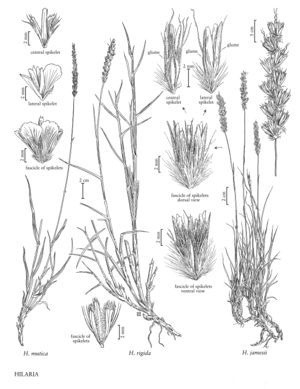Difference between revisions of "Hilaria mutica"
FNA>Volume Importer |
imported>Volume Importer |
||
| (8 intermediate revisions by 2 users not shown) | |||
| Line 7: | Line 7: | ||
|synonyms={{Treatment/ID/Synonym | |synonyms={{Treatment/ID/Synonym | ||
|name=Pleuraphis mutica | |name=Pleuraphis mutica | ||
| − | |authority= | + | |authority= |
| + | |rank=species | ||
}} | }} | ||
|hierarchy=Poaceae;Poaceae subfam. Chloridoideae;Poaceae tribe Cynodonteae;Hilaria;Hilaria mutica | |hierarchy=Poaceae;Poaceae subfam. Chloridoideae;Poaceae tribe Cynodonteae;Hilaria;Hilaria mutica | ||
| Line 19: | Line 20: | ||
-->{{Treatment/Body | -->{{Treatment/Body | ||
| − | |discussion=<p>Hilaria mutica grows in level upland areas and desert valleys subject to occasional flooding but lacking permanent streams. Its range extends into northern Mexico. Although H. mutica has moderate forage value, its palatability is low and it is frequently infected with ergot.</p> | + | |discussion=<p><i>Hilaria mutica</i> grows in level upland areas and desert valleys subject to occasional flooding but lacking permanent streams. Its range extends into northern Mexico. Although <i>H. mutica</i> has moderate forage value, its palatability is low and it is frequently infected with ergot.</p> |
|tables= | |tables= | ||
|references= | |references= | ||
| Line 28: | Line 29: | ||
-->{{#Taxon: | -->{{#Taxon: | ||
name=Hilaria mutica | name=Hilaria mutica | ||
| − | |||
|authority=(Buckley) Benth. | |authority=(Buckley) Benth. | ||
|rank=species | |rank=species | ||
| Line 35: | Line 35: | ||
|basionyms= | |basionyms= | ||
|family=Poaceae | |family=Poaceae | ||
| + | |illustrator=Linda A. Vorobik;Karen Klitz | ||
| + | |illustration copyright=Utah State University | ||
|reference=None | |reference=None | ||
|publication title= | |publication title= | ||
|publication year= | |publication year= | ||
|special status= | |special status= | ||
| − | |source xml=https:// | + | |source xml=https://bitbucket.org/aafc-mbb/fna-data-curation/src/200273ad09963decb8fc72550212de541d86569d/coarse_grained_fna_xml/V25/V25_914.xml |
|subfamily=Poaceae subfam. Chloridoideae | |subfamily=Poaceae subfam. Chloridoideae | ||
|tribe=Poaceae tribe Cynodonteae | |tribe=Poaceae tribe Cynodonteae | ||
Latest revision as of 17:59, 11 May 2021
Plants perennial; cespitose, rhizomatous. Culms 30-60 cm, erect, geniculate at the middle nodes; nodes glabrous or pubescent, hairs to 0.3 mm. Sheaths glabrous or sparsely pilose on the margins; ligules 0.5-2 mm, lacerate; blades 2-15 cm long, 2-4 mm wide, mostly scabrous on both surfaces, with papillose-based hairs behind the ligules. Panicles 4-8 cm; fascicles 5-8 mm. Lateral spikelets with 1 or 2(4) staminate florets; glumes not conspicuously fused basally, thin, papery, flabellate, dorsally awned, awns not exceeding the apices, apical lobes rounded, ciliate to finely laciniate, veins not or scarcely excurrent; anthers 3, 2.5-3.5 mm. Central spikelets with 1 bisexual floret; glumes with 1 or more divergent, dorsal awns, apical lobes, ciliate to finely laciniate, veins excurrent; lemmas exceeding the glumes, bilobed, mucronate. 2n = 36, 54.
Discussion
Hilaria mutica grows in level upland areas and desert valleys subject to occasional flooding but lacking permanent streams. Its range extends into northern Mexico. Although H. mutica has moderate forage value, its palatability is low and it is frequently infected with ergot.
Selected References
None.
